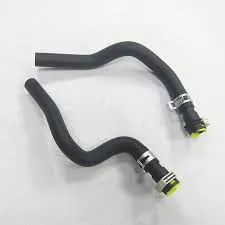brake line on car
Lis . 13, 2024 03:03 Back to list
brake line on car
Understanding Brake Lines A Critical Component of Vehicle Safety
When it comes to vehicle safety, most people think of seat belts, airbags, and tires. However, one of the most crucial but often overlooked components is the brake line. This essential system plays a vital role in ensuring your vehicle can stop effectively when you hit the brakes, making it a subject worth exploring.
What are Brake Lines?
Brake lines are the tubes that carry brake fluid from the master cylinder, which is the part of the braking system that generates pressure, to the brake calipers at the wheels. This hydraulic system is responsible for transferring force from the foot pedal to the brake pads that clamp onto the rotors, thus slowing down or stopping the vehicle. Brake lines can be made of various materials, including rubber and metal, and each type has its own advantages and disadvantages.
Types of Brake Lines
1. Rubber Brake Lines These flexible tubes are common in many vehicles. They can withstand the movements of the suspension system without failure. However, over time, rubber brake lines can degrade due to heat, moisture, and exposure to road contaminants, leading to potential leaks and failures.
2. Steel Brake Lines Typically found in high-performance or heavy-duty vehicles, steel brake lines are more durable and resistant to damage. They provide a firmer feel when braking, as they do not expand under pressure like rubber lines. However, they can be susceptible to rust if the protective coating is compromised.
3. PTFE Brake Lines Also known as Teflon lines, these are often covered with a protective sheath of braided stainless steel. PTFE lines provide excellent resistance to heat and corrosion and are favored in racing applications due to their low expansion characteristics.
Importance of Brake Line Maintenance
Maintaining brake lines is a critical aspect of vehicle safety and performance. Regular inspections can help identify issues such as leaks, cracks, and wear and tear. The brake fluid itself is also something that requires attention; moisture can accumulate in the system over time, leading to corrosion and a decrease in braking effectiveness. It’s advisable to flush the brake system and replace the fluid according to the manufacturer's recommended intervals.
Common Issues with Brake Lines
Brake line failure can occur due to several reasons, including
brake line on car

- Corrosion When brake lines are exposed to harsh weather, road salt, and moisture over time, they can corrode, leading to leaks.
- Harsh Driving Conditions Driving on rough terrain can cause excessive wear on brake lines, leading to fractures and potential failure
.- Improper Installation If brake lines are not installed correctly, they can be pinched or kinked, causing pressure loss in the braking system.
- Heat Damage Continued exposure to high temperatures can degrade rubber brake lines, making them brittle and more prone to failure.
Signs of Brake Line Problems
Knowing the signs of brake line issues can prevent accidents and costly repairs. Some common indicators include
- Soft or Spongy Brake Pedal If the pedal feels softer than usual, it could mean there's air in the brake lines or a leak.
- Fluid Leaks Puddles of brake fluid under your vehicle are a significant warning sign that your brake lines may be compromised.
- Warning Lights Dash warning lights related to the braking system should never be ignored.
- Unusual Noises Any squeaking, grinding, or hissing sounds when you apply the brakes should be inspected immediately.
Conclusion
In summary, brake lines are a fundamental component of a vehicle’s braking system, and understanding their function is vital for vehicle safety. Regular inspection and maintenance are crucial to prevent potential failures that can lead to dangerous situations on the road. By staying informed and proactive about brake line care, drivers can ensure a safer driving experience for themselves and others on the road.
Latest news
-
Air Conditioning Charging Hose: Durable AC Recharge Kits
NewsAug.22,2025
-
Premium 4890 AC Hose | Durable & Perfect Fit Replacement
NewsAug.21,2025
-
High-Quality AC Hose: Compressor to Evaporator for Car
NewsAug.19,2025
-
Glass Storage Jar with Acacia Vacuum Vented Cover - HEBEI KEMO|Thermal Resistance, Food-Grade Safety, Eco-Friendly
NewsAug.18,2025
-
Glass Storage Jar with Acacia Lid - Hebei Kemao | Heat-Resistant, Eco-Friendly
NewsAug.18,2025
-
Glass Storage Jar with Acacia Vacuum Vented Cover - HEBEI KEMO|Thermal Resistance,Eco-Friendly Storage
NewsAug.18,2025
